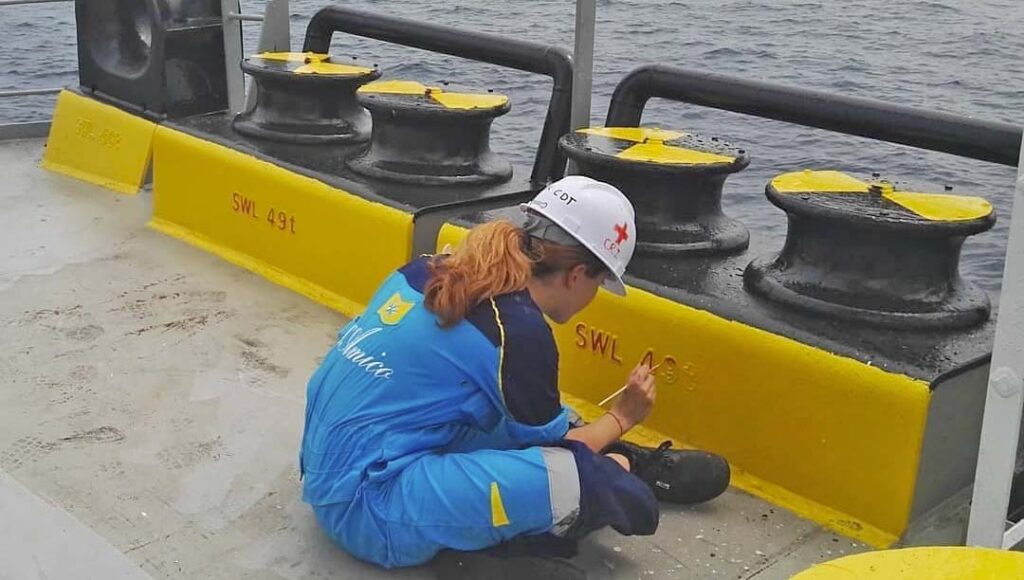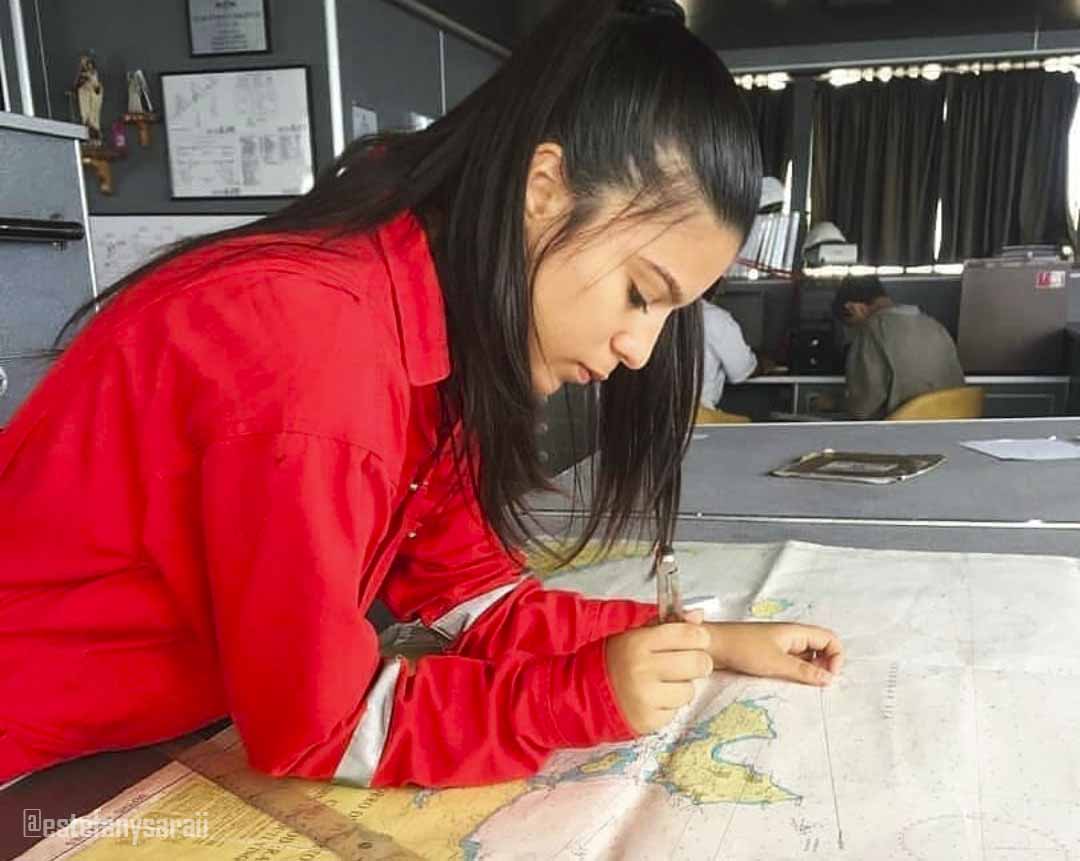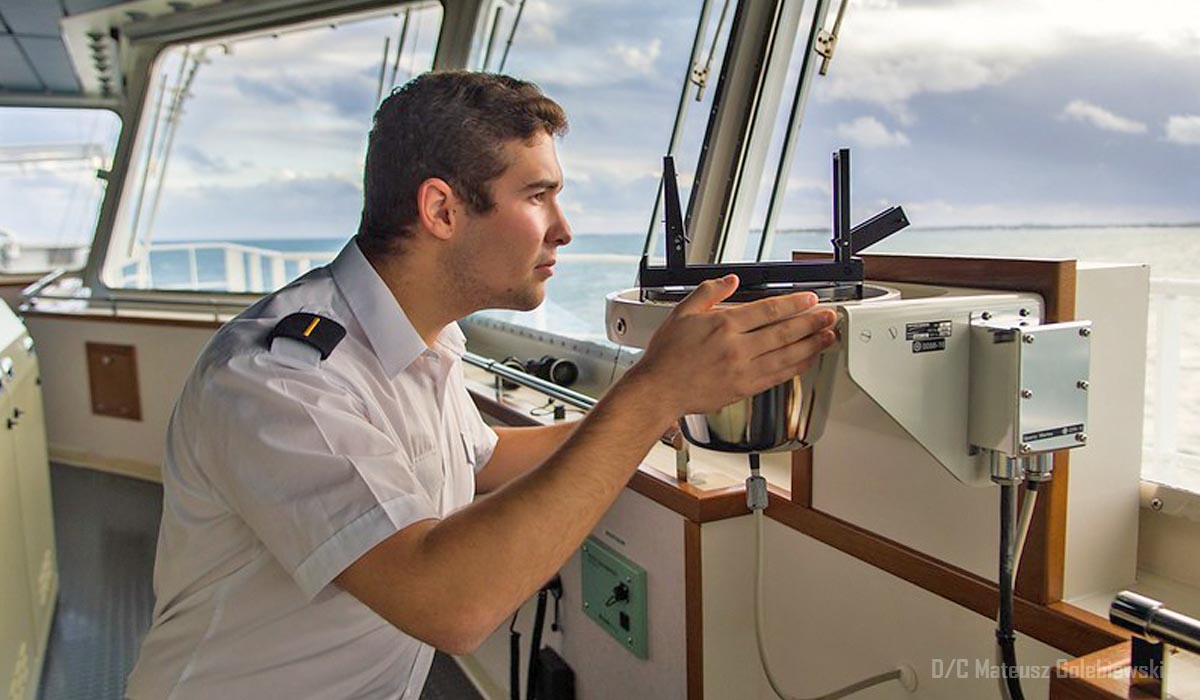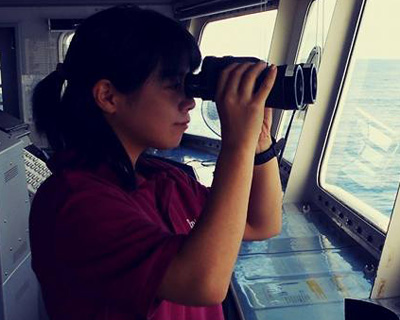If you think that a deck cadet is an indispensable part of the shipboard organization, this will disappoint you.
They may be an essential solution for the shortage of competent officers but these apprentices are not “must haves” on board.
Sounds ironic? Let’s keep going.
What is a Deck Cadet?
A deck cadet is a trainee nautical officer who is learning the duties of deck officers on board a ship.
His role is to train to become the next “mate”, and does this by completing various tasks under a structured training program.
Simply put, whatever the officers are doing, a deck cadet does them as well. But his training is not limited to the seamen in uniforms.
He also conducts deck maintenance under the supervision of the Chief Officer and the Bosun.
Furthermore, he spends time in the engine room too, to familiarize himself with the responsibilities of the engineers.

What does a Deck Cadet do?
As mentioned earlier, a deck cadet’s job is to perform the work of the officers. He spends time with the Third Mate, Second Mate, and Chief Mate to learn the specifics of their roles on board.
His job includes paperwork, checklists, chart work, navigation, inspections, discharging and loading operations, mooring and unmooring, lookout duties, steering, and a whole lot more!
During my cadetship, I was immediately in charge of plotting the ship’s position on the paper chart, taking gyro errors, writing on the deck logbook, updating crew lists, and many other tasks.
I learned a lot back then.
After the assignments with the officers, he is also sent to carry out various jobs on deck to understand the maintenance aspect of the vessel.
In short, a cadet’s duty is to dip his feet into every facet of a mariner’s job.
But let’s not forget about the Captains.
Captains don’t train them directly. Their role is to supervise their learning by asking questions, some of them tough, to test the cadet’s progress.
Duties and Responsibilities
If the cadet is assigned with the third officer, his duties encompass those of the third mate’s job.
Here are some of them:
- conduct an inspection of the safety and firefighting equipment like the BA sets, fireman’s outfit, EEBD, lifeboat rations, etc.
- make reports such as safety drills and near misses.
- write logbook entries.
- do inventories of safety equipment, and order spare if necessary.
- recognize different emergency alarm signals.
When he works with the Second Mate, his duties shift focus to the bridge such as:
- voyage planning and navigation
- chart and publication corrections
- noon reports
- ETA calculations
- celestial navigation
- bridge equipment testing
Together with the Chief Officer, his training will be more on cargo-related jobs. Such duties involve:
- cargo monitoring
- creating a loading/ discharge plan
- performing tests on various equipment
- logging entries into record books
- completing cargo calculations
Aside from all those, he must be familiar with the Master and Bridge Standing Orders, as well as company policies regarding health, safety, and the environment.
He can find these on different manuals usually found on the ship’s office, CCR, or the shipboard computer.
Lastly, he performs regular deck maintenance when on deck with the bosun and the rest of the deck crew.
Such tasks involve chipping, painting, greasing, cleaning, sweeping, segregating the garbage, and assisting other crew.
Though he has a variety of duties, the responsibility still lies with the officer-in-charge, especially his training officer who is the Chief Mate.

Do all ships have deck cadets?
The short answer is a resounding “No!”
These apprentice cadets may be groomed for the continuity of qualified officers but not all vessels employ them.
In fact, it is not mandatory for shipping companies to have them onboard. But there are a few who recognize the importance of training the next generation of officers.
A good example is the shipping giant Maersk. They offer a cadetship training program for deserving students who want to take a career at sea.
Other entities also accept cadet scholarships like the Norwegian Shipowners Association (NSA), the International Maritime Employers’ Council (IMEC), and other shipping companies.
Some companies who can’t afford to sponsor cadets still try to find the best ones not under any of those scholarships.
They go to different accredited maritime schools in the country and conduct assessments to filter promising students.
They make an agreement with the one who passes the tests that after they graduate, these students can work on one of their ships.
Why are they not mandatory?
Deck cadets are indeed trained to become the next competent and responsible officers. Some companies even invest in their education at an early age.
But sending trainee officers on board is not mandatory.
Officers do not only come from the ranks of deck cadets. Any crew on board can become one provided he has completed all the required training and certificates- COP and COC.
ABs, bosuns, OS, and pumpmen have a chance to become Master Mariners if they choose to. Hence, cadets are optional for some companies.
There is also no regulation that requires them to raise cadets on board.
Advantages of being a deck cadet
The main advantage of cadets is the access to hands-on practice every day on board.
Their job is to learn and study. This means they have all the training available as part of their working hours.
Hands-on experience
The officers are obliged to teach them and not doing so may create a problem once a report reaches the shoreside office.
Now this translates to more learning, understanding, and participation in how to run a ship at an early part of their career.
They get to experience a sense of responsibility while performing those duties and this is crucial for building a strong foundation.
Compare this with other ratings who have to sacrifice extra (unpaid) hours to learn an officer’s job.
Sometimes, the day’s work could be so strenuous that they rather rest than make this feat.
Licensure qualification
In many systems, cadets only have to complete one year of sea service to qualify for a licensure examination. Ratings need to have a minimum of 36 months.
See the distinction? By the time a rating finishes his 36th month, the cadet may already be an officer.
Notice how much of a time difference it makes.

Is there an age limit?
Age limits for deck cadets depend on the company’s hiring policy.
Normally, the age requirement is at least 18 years old. But some nationalities allow 16-year-olds to train as cadets on board.
Other than that, there used to be no age requirement when applying for a job on ships for certain positions, including deck cadets, as long as you were of legal age.
However, everything changed due to stricter regulations and an overabundance of readily available crew.
Some scholarships have age limits for their cadetship programs. Applicants who are 24 years old and above may find it difficult to land this position.
Even if a person is qualified both in skill and knowledge, he may not be qualified for a cadetship if proven beyond the required age.
Salary
As the lowest ranking member on board, deck cadets are one of the least-paid crew members on board.
Depending on the company, they earn between $500 and $1,000. The type of ship is also a factor as with every salary of a seaman.
But if you are a cadet, or want to become one, salary should not be your main concern. You must focus on the training and absorb as many lessons as you can.
By the time your 12-month apprenticeship ends, you will be ready to become a competent ship officer. Your salary will skyrocket as well.
What companies accept cadets?
Many shipping companies accept cadets aside for their cadetship programs. You can check their Facebook pages or websites to see them.
Local manning agencies like NYK, BW Shipping, Eastern Mediterranean, MSC, Wilhelmsen Ship Management, V Ships, Anglo Eastern, Fleet Management, and many others have that structure.
Even cruise ship companies like Carnival Cruise Line and Royal Caribbean list job openings for this position.
Today, there is also a surprising growth of female cadets- we call them cadettes, entering this field.
I met a Japanese sea woman online when she was an apprentice and now, she is a Chief Officer on a Chemical Tanker.
A few have reached the peak of this career and are happily commanding their vessel.
May the winds be in your favor.



Is there any vacancy or Link were I can apply as Deck cadet, I’m a graduate of nautical science.
Hello and good day. It’s seldom to find any online job postings for deck cadets as these positions are often filled up. The best way is to go to the shipping companies and directly apply to them.
Here’s a list to get you started: DMW-Accredited Manning Agencies in the Philippines 2023